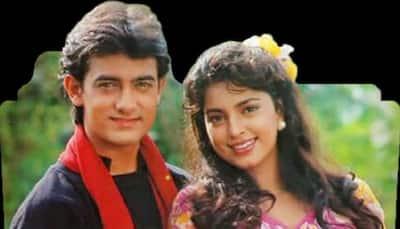
New Delhi: It was in 1988 when a poignant and illustrious love story graced the silver screens and captured the collective imagination of a nation. ‘Qayamat Se Qayamat Tak’ (QSQT), as it came to be known, not only etched itself in the annals of Indian cinema history but also emerged as the epitome of heartfelt storytelling that resonates after 36 years. Presenting a narrative that has stood the test of time, QSQT today celebrates its 36th anniversary since it reimaged what a cinematic love story could be.
This cinematic saga heralded the arrival of Aamir Khan, a then novice actor whose portrayal of Raj won over both the audience’s hearts and critical acclaim. The film’s lasting legacy is partly owed to the incandescent chemistry shared between Aamir Khan and his co-star, Juhi Chawla. Their on-screen romance was natural and vibrant, contributing significantly to their eventual superstardom in the Bollywood industry. QSQT set a new benchmark for on-screen couples and was undoubtedly instrumental in catapulting both actors to the zenith of their careers.
The directorial finesse of Mansoor Khan wove a compelling narrative that left a mark not only visually but melodically as well. The film’s songbook, composed by the legendary duo Anand-Milind and penned by poet-lyricist Majrooh Sultanpuri, struck a chord with audiences, who instantaneously fell in love with the soulful tracks. The soundtrack’s emotional depth was profound, with hits such as ‘Papa Kehte Hain,’ ‘Akele Hain Toh Kya Gum Hai,’ and ‘Ae Mere Humsafar’ becoming anthems for generations, never losing their melodic charm and emotional resonance.
QSQT did more than just narrate a romantic tale; it delved into deeper societal issues prevalent during that era. Themes such as parental opposition, societal expectations, and the inevitable clash between traditional values and modernity were explored, making the film all the more relatable and impactful. With its narrative innovation and authenticity, QSQT heralded a new era of storytelling in Hindi cinema, which focused on the emotional resonance of characters and plots.
The film’s influence extended beyond the mere aspects of narrative and music; QSQT served as a defining moment for the Indian film industry. It significantly altered the course of Indian cinema, particularly in its genre, by introducing a new strain of romantic storytelling that became a blueprint for films in the decade that followed. Emphasizing the potency of young love against the backdrop of familial discord resonated with viewers, subsequently leading QSQT to be recognized with the prestigious National Film Award for Best Popular Film Providing Wholesome Entertainment.
Though the film industry has undergone extensive evolution over the decades, the legacy of ‘Qayamat Se Qayamat Tak’ remains unblemished. It has set a precedent for romantic storytelling, leaving an indelible imprint on the cinematic landscape. The film continues to be revered and celebrated for capturing the intricacies of young love while gracefully addressing the societal challenges that attempt to impede it.
QSQT’s narrative boldness, impactful performances, and ageless musical score have not only captured the hearts of its viewers but also etched an enduring legacy in the history of Indian cinema. Thirty-six years on, its cultural significance and charm remain undiminished, both as a timeless work of art and as a benchmark for romantic storytelling. Even as the Indian film industry propels forward with new stories and technological advancements, the story of ‘Qayamat Se Qayamat Tak’ lives on, revered and relived as one of the quintessential love stories of the century.










